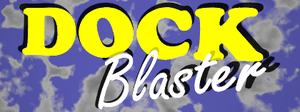DOCK Blaster: Difference between revisions
m (→Help) |
m (→Versions) |
||
| Line 59: | Line 59: | ||
= Versions = | = Versions = | ||
Work on DOCK Blaster began in the fall of 2000. The first web-based interface became available locally in 2003. We started selective pre-alpha testing in 2006, alpha testing with external users in 2007, and wide-spread beta testing in 2008. | Work on DOCK Blaster began in the fall of 2000. The first web-based interface became available locally in 2003. We started selective pre-alpha testing in 2006, alpha testing with external users in 2007, and wide-spread beta testing in 2008. For more info, please see [[DOCK Blaster:History]]. | ||
DOCK Blaster | |||
[[Category:DOCK Blaster]] | [[Category:DOCK Blaster]] | ||
[[Category:Portal]] | [[Category:Portal]] | ||
Revision as of 19:56, 10 August 2009
DOCK Blaster is a free service for running docking screens, on the web at http://blaster.docking.org. DOCK Blaster was developed in the Shoichet Lab at UCSF during the years 2000-2009. The service became public in August 2009, and a paper was published in J Med Chem in September 2009. The current version is 1.0.1.
What you need to start
To use DOCK Blaster you will need the structure of a protein target and an indication of the binding site. There are three ways to do this:
- If your target is in the PDB, you may simply specify the PDB code, in the Parser.
- If your target is not in the PDB, or you edited a PDB file, use the Preparer. The steps are:
- Upload the target in PDB format (preferred) or mol2 format
- Specify the binding site using
- a docked ligand in mol2 format (preferred) or
- "hot spots", in PDB format
- atoms of residues forming the binding site, the center of inertia of which should be where you expect the ligand to go.
- Click "DOCK" and wait for the job to run (typically under 1 hour).
- If you do not have a particular target in mind and are simply curious about DOCK Blaster, you may select "I'm feeling lucky", and we will pick a target for you from the PDB.
To try one of the examples featured in the DOCK Blaster paper (Irwin et al., J Med Chem, 2009, in press, please consult the sample data.
Preparation
Calculation
- Job Management
- Results
- Technical Details of the calculation
Interpretation
Other topics
To cite DOCK Blaster, please reference Irwin, Shoichet, Mysinger et al., "Automated docking screens: a feasibility study", J Med Chem (2009), in press.
Help
For help with DOCK Blaster, please join and write to the DOCK Blaster mailing lists blaster-fans at docking.org. We welcome your feedback about DOCK Blaster. Please send bug reports to support at docking.org. Please send opinions to comments at docking.org.
Versions
Work on DOCK Blaster began in the fall of 2000. The first web-based interface became available locally in 2003. We started selective pre-alpha testing in 2006, alpha testing with external users in 2007, and wide-spread beta testing in 2008. For more info, please see DOCK Blaster:History.
